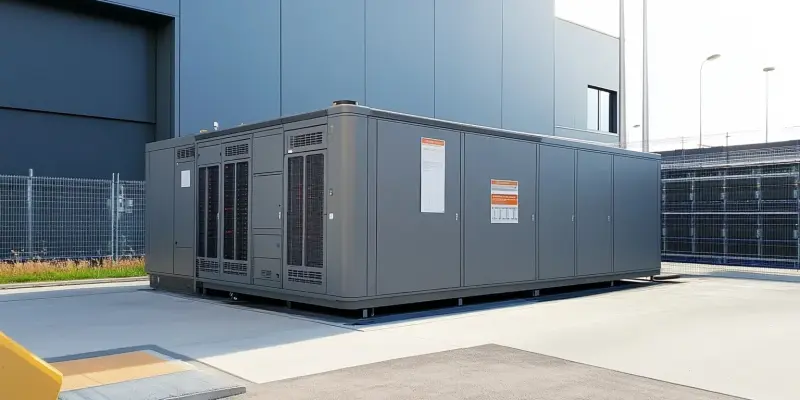As we approach 2025, the pressing issue of energy takes center stage for data center operators, driven by the exponential growth of artificial intelligence (AI). Throughout 2024, data center operators intensely sought solutions to secure sufficient power for new AI-driven facilities. The increased adoption of AI, recognized as more than a transient trend, has highlighted the substantial power demands associated with high-performance GPUs, necessitating enhanced cooling and increased energy supply.
Exploring Energy Alternatives
Natural Gas, Hydrogen, and Nuclear Power
In 2024, several energy alternatives were explored to meet the burgeoning power demands of data centers fueled by AI advancements. Companies like New Fortress Energy and Enchanted Rock pushed for the use of natural gas as a more reliable source, whereas startup ECL proposed an innovative approach with hydrogen fuel cell-powered modular off-grid data centers. Amid these alternatives, nuclear power gained prominence as the dominant solution. Leading tech giants such as Amazon, Microsoft, Oracle, and Google pursued nuclear power deals, recognizing its potential for providing reliable, high-capacity, and low-carbon energy, vital for maintaining steady operations in the face of increasing digital transformations.
Despite the excitement surrounding nuclear power, its deployment is not without challenges. Regulatory hurdles and public acceptance issues pose significant barriers. Aaron Binkley, VP of Sustainability at Digital Realty, articulated the importance of nuclear power, emphasizing its role as a clean, 24/7 energy source. This energy form complements intermittent renewable sources like solar and wind, crucial for creating a balanced clean energy mix. However, Binkley also highlighted the necessity of managing nuclear power efficiently and safely to maximize its benefits and assuage public concerns.
Renewables and Hybrid Approaches
While companies explore nuclear options, leveraging renewable energy sources in the short term has been a practical solution. Digital Realty, for instance, secured a deal to power 11 of its Illinois data centers with renewable solar energy. Although solar energy’s inconsistency means it cannot be relied on solely, its integration with other renewable sources like wind, geothermal, and hydropower considerably reduces emissions. This hybrid approach to energy sourcing has been an essential step in mitigating environmental impacts while addressing the growing power needs induced by AI infrastructure.
Looking forward, Binkley projects a continued focus on sourcing renewable energy and driving innovation in how these renewables are seamlessly integrated into the electrical grid. The development of flexible loads is seen as a crucial step in enhancing grid reliability for all users. Alongside traditional renewables, cleaner fuels such as HVO renewable diesel for backup generators and operational strategies to minimize generator usage are being explored. Cutting-edge technologies, including small modular nuclear reactors and advanced geothermal solutions, are also predicted to introduce new capabilities to the energy landscape, offering additional tools to meet the evolving demands of data centers.
Strategic Energy Planning for Future Demands
AI’s Impact on Energy Consumption
The year 2024 underscored the critical importance of strategic energy planning for data centers, predominantly driven by AI’s substantial power consumption. As high-performance GPUs and advanced AI algorithms proliferate, the strain on existing energy infrastructures has become increasingly evident. This significant power consumption necessitates not only enhanced energy supply but also sophisticated cooling systems to maintain optimal operating conditions.
In response, the data center industry has made concerted efforts to diversify and innovate in energy sourcing, reflecting a broader trend towards embracing sustainable and reliable energy futures. Industry leaders are conscientiously balancing immediate energy requirements with long-term sustainability goals, ensuring their facilities can support ongoing technological advancements like AI while minimizing negative environmental impacts. This forward-thinking approach is increasingly imperative, as AI technologies continue to evolve and fuel further digital transformation across various sectors.
New Energy Technologies and Innovations
As we near 2025, the critical issue of energy management becomes increasingly vital for data center operators, especially with the rapid expansion of artificial intelligence (AI). Throughout 2024, operators have been urgently searching for solutions to ensure they can secure the necessary power for new AI-driven facilities. The surge in AI adoption, now recognized as more than just a passing trend, has brought to light the immense power requirements of high-performance GPUs. These powerful systems not only demand a significant energy supply but also require enhanced cooling solutions to maintain their optimal functionality. Data center operators have been grappling with these dual challenges of increased energy consumption and the need for more efficient cooling methods. The exponential growth of AI underscores the importance of developing sustainable energy strategies. This rapid technology progression means that operators must innovate and adapt continually to meet the evolving demands of AI, ensuring both operational efficiency and energy sustainability in the years ahead.

